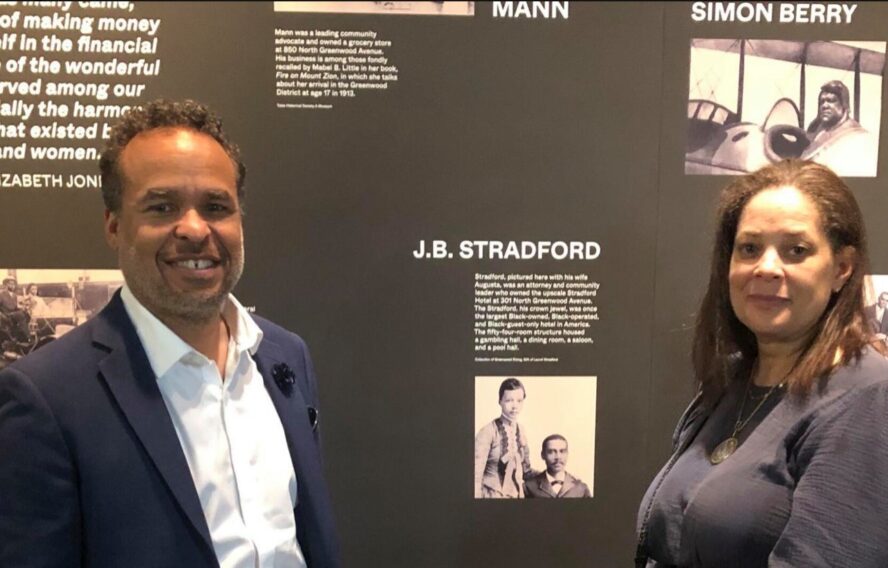
The descendants of Greenwood hotelier J.B. Stradford do not want his name used on the future Stradford21 hotel in north Tulsa, according to Nate Calloway and Victoria Rogers, two of Stradford’s great-great-grandchildren.
Ground was broken on the 109-room hotel Sept. 21 as the first of a three-phase development by Tulsa-based Alfresco Group LLC at 36th Street North just east of LL Tisdale Parkway. The hotel is the vision of Alfresco Group CEO Antoine Harris and will be managed by New Century Hotels under the Wyndham Trademark brand.
Calloway, a filmmaker based in Los Angeles, and Rogers, a design strategist based in New York, are two members of the five-member family committee also comprised of Stradford grandchildren and great-grandchildren.
The Stradford Hotel was the largest Black-owned hotel in the country before its destruction in the 1921 Tulsa Race Massacre. Owner J.B. Stradford survived the Massacre, fleeing to Sand Springs and then to Kansas, before settling in Chicago, Calloway said in an Oct. 8 Zoom interview. Though Stradford opened other businesses, he never operated another hotel. Calloway calls the Stradford Hotel in Tulsa his great-great-grandfather’s “crowning glory” and one of few hotels where Blacks were welcome to stay overnight in the era of Jim Crow laws.
Stradford and other Greenwood entrepreneurs and property owners were not compensated for the loss of their businesses and homes in the Massacre. “There’s been a lot of talk about doing the right thing (regarding the Massacre) whether it’s reparations, or just giving back to the survivors and the descendants the property that was stolen,” Calloway said.
“Our generational wealth was taken from us. But the one thing we did have was our name and our legacy, and now it appears they’re even trying to monetize that, to keep that from the families, as well … We want to be the stewards of that legacy and of the name. We’d like to be consulted with, and we’d also like to be compensated.”
In a statement sent to TulsaPeople on Oct. 12, Antoine Harris, CEO of Alfresco Group, wrote, “When AG started on this journey to redevelop and change the narrative of our Tulsa historic Black community more than five years ago, our intention was to pay homage to our ancestors who lost so much in the 1921 Race Massacre. During the (Massacre) centennial commemoration we were made aware of J.B. Stradford’s descendants. At that time, I requested an introduction to a family member in order to share our vision for the Stradford21 boutique hotel.”
Harris’ statement goes on to say Rogers reached out to him shortly after the hotel’s Sept. 21 groundbreaking and requested a proposal from Alfresco Group for the use and licensing of the name “Stradford Hotel.”
Harris also wrote in his statement, “In response Ms. Rogers’ request, I extended an invitation for the family to participate in the future ribbon-cutting ceremony, invited the Stradford family’s input into the family history for a visual display to be shared with all hotel guests and offered to make an annual donation to an agreed-upon nonprofit or charity in honor of J.B. Stradford. These invitations offered by AG were rebuffed by Ms. Rogers. It appears that monetary gain is the primary motivation for Ms. Rogers.”
In response, Rogers wrote to TulsaPeople, “Antoine assured me that his company and Wyndham Group would not move forward with using our name for their hotel without our family’s explicit support. This statement is the first time I’ve seen that he does not intend to honor this commitment to us. The modification (‘21’) does not shift the intent: to use our family’s name for a commercial venture without our consent.
“Our family’s hotel was taken from us once,” continued Rogers, the daughter of investor and philanthropist John Washington Rogers Jr. and Desirée Rogers, former White House social secretary during the Obama administration. “Our legacy and our name are part of what remains. To have a stranger attempting to both monetize and shape the story of our family’s legacy is offensive and hurtful. To project a financial motive onto me is without thought or care. I hope that Antoine will redirect his efforts to honor his ancestors’ legacies.”
When asked whether the Stradford descendants plan to take legal action against Alfresco Group/Stradford21, Calloway declined to comment. However, it appears the family has no legal right to Stradford’s name, image and likeness, also known as the “postmortem right of publicity.”
Local intellectual property attorney Rachel Blue of the law firm McAfee and Taft explained that whether postmortem right of publicity exists is a matter of the law of the state in which the deceased person lived at the time of their death. Stradford lived in Chicago until his death in 1935; however, the state of Illinois did not have a postmortem right of publicity until 1999. The statute only protects post mortem rights of individuals who died after 1999.
Had Stradford still lived in Oklahoma when he died, the result might be different. Oklahoma law protects rights of publicity for a deceased person for 100 years after their death if the deceased’s name, image and likeness had some commercial value, explains Blue, who doesn’t represent either party in this matter.
Stradford’s position as a prominent Greenwood business owner arguably provides commercial value.
According to the U.S. Patent and Trademark Office, Rogers filed an “intent to use” application on Aug. 26 for the mark “Stradford Hotel” for “Providing a web site featuring information on historic figures.” Alfresco Group filed an “intent to use” application Oct. 12 for the mark “Stradford21 Hotel” for hotel services.
Although both marks contain “Stradford,” the applications list different services. The USPTO looks at both the mark and the services referenced in the application to determine whether to approve a trademark.
At press time, neither application had been examined by the USPTO yet.









